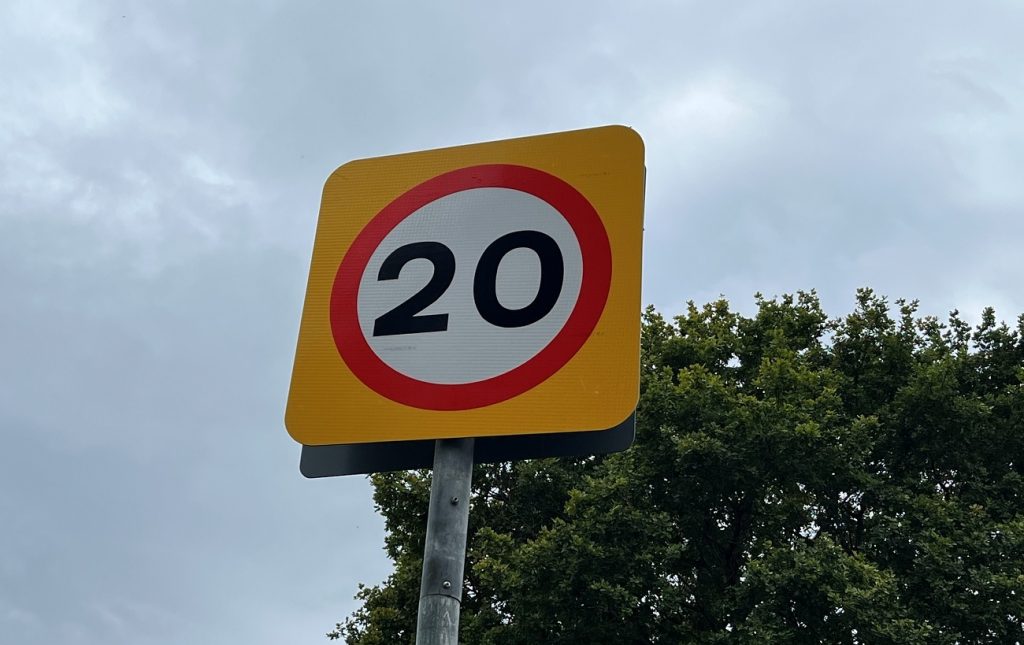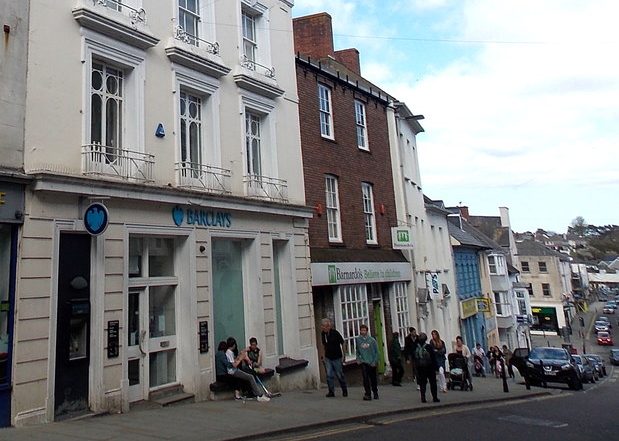News
Tenby: Eye test leads to the discovery of woman’s brain tumour
 A MOTHER of two from Tenby has thanked her local opticians after a check-up helped to detect a potentially sight-threatening brain tumour.
A MOTHER of two from Tenby has thanked her local opticians after a check-up helped to detect a potentially sight-threatening brain tumour.News
Change of course over Wales’ 20mph speed limit

WALES’ new transport secretary confirmed a change of course on the controversial 20mph policy but continued to face calls to scrap the default speed limit completely.
Ken Skates told the Senedd the 20mph policy will be targeted at schools, hospitals, nurseries, community centres, play areas and built-up residential areas.
Mr Skates said the Welsh Government will revise guidance on exceptions by the summer, with work to adjust speed limits expected to begin from September.
In response to councils’ concerns about costs, such as for swapping signs, he confirmed the Welsh Government will foot the bill for reverting roads back to 30mph.
Mr Skates said: “What I am doing now is listening to what people want for the roads in their communities and pressing ahead with refining the policy.”
Giving a statement on his priorities, the newly appointed cabinet secretary for north Wales and transport committed to listening to people to get the “right speed on the right roads”.
He said: “Ultimately, the degree of change in each of our 22 local authority areas will not be determined by me and the Welsh Government but by the public and councils.”
Mr Skates encouraged people to contact their local council via the Welsh Government’s website to have their say about where 20mph should be targeted.
The transport secretary, who returned to the frontbench in Vaughan Gething’s reshuffle in March, said an external review of the 20mph policy will be published in the next few weeks.
Mr Skates, who replaced Lee Waters, told the chamber new roads will be built and existing ones improved, with the network better designed to accommodate bus priority lanes.
Nearly half a million people signed a record-breaking Senedd petition, calling for the “disastrous” 20mph policy, which came into force in September, to be scrapped.
Pointing out that 20mph will remain the default, Natasha Asghar, the Conservatives’ shadow transport secretary, also called for the “daft, divisive and destructive” law to be abandoned.
She said: “It is clear from the rhetoric that the Welsh Government has finally cottoned on to the fact that the 20mph policy has been a complete shambles.”
The South Wales East MS urged the Welsh Government to go further by making 30mph the default speed limit with exceptions made for 20mph, rather than the other way around.
Ms Asghar warned that anything less than rescinding the law is just paying lip service.
However, Mr Skates argued the Conservatives’ suggested approach, which would require traffic regulation orders, would bankrupt Wales and increase red tape.
Delyth Jewell, Plaid Cymru’s shadow transport secretary, criticised the Welsh Government’s decision not to pursue legal action against UK ministers over HS2 funding.
Ms Jewell, who also represents South Wales East, told the chamber billions of pounds are at stake which would have a material effect on improving Wales’ transport services.
She said: “HS2 tracks don’t travel into Wales at all but we are paying for it all the same,” with Mr Skates responding that legal advice suggesting a challenge would likely fail.
The Plaid Cymru deputy leader raised concerns about drastic cuts to vital bus services, arguing investment in rail should not come at the expense of buses.
Turning to 20mph, Ms Jewell said it is important not to lose sight of the radical policy’s aim as she highlighted that a four-year-old girl was killed in a crash in Birmingham last week.
Plaid Cymru’s Heledd Fychan raised concerns about cuts to learner travel, saying no child should miss a day of school because they cannot afford the bus.
Vowing to work with Lynne Neagle, Wales’ new education secretary, on home-to-school transport, Mr Skates said the future of buses is one of his very top priorities.
Swansea East MS Mike Hedges called for a rebalancing of support between buses and rail.
Mr Skates told the Labour backbencher a forthcoming bill on bus services will correct the “great mistake” of privatisation in the mid-1980s.
Pressed by Plaid Cymru leader Rhun ap Iorwerth about calls for a third Menai crossing, Mr Skates did not rule it out but warned that public finances are incredibly tight.
Hefin David, the Labour MS for Caerphilly, welcomed plans to review the 20mph guidance, calling for councillors, who know their communities best, to be involved in discussions.
Community
County Hall to offer space for community banking

A CALL for Pembrokeshire County Council to potentially change its banking arrangement with Barclays, after it closed its Haverfordwest branch has been turned down, but County Hall is to offer space for community banking.
Barclays Bank, on the town’s High Street, is to close on May 10.
The council has had a banking services contract with Barclays since 2013.
Councillor Huw Murphy, in a notice of motion heard by Pembrokeshire County Council’s Cabinet meeting of April 22, asked the council to review its banking arrangements with Barclays following the announced closure.
e said the loss of a branch “not only impacts upon town centres and businesses but also disproportionately impacts the elderly who are less likely to embrace on-line banking options”.
A report for Cabinet members said, in terms of the impact on Pembrokeshire residents, Barclays has said that it is “not leaving Haverfordwest and [will] continue to provide face-to-face support for those who need it” via community locations.
Two options were presented to Cabinet: to retender the banking services contract, and, the favoured, to work with Barclays to ensure a community location is set up in Haverfordwest.
Members heard the costs associated with moving to a new banking service provider could be in excess of £50,000.
For the second, favoured option, members heard Barclays was in discussions with the council about a location for potential community banking.
Cabinet Member for Corporate Finance Cllr Alec Cormack, after outlining the risks in the report for members, and moving the notice be not adopted, said he had “considerable sympathy” with Cllr Murphy’s notice.
He told councillors there was a glimmer of light for banking arrangements in the county, with an agreement now signed for two ground floor rooms at County Hall, Haverfordwest, to be used for community banking.
From April 25, the rooms will be available on Wednesdays, Thursdays, and Fridays, members heard.
Cabinet Member for Planning & Housing Delivery Cllr Jon Harvey also said he had “a lot of sympathy” for the motion, adding: “It’s excellent news a deal has been struck to occupy the ground floor rooms three days a week; hopefully this will mitigate, to a certain amount, the closure.
“If we can work with the respective banks to get a community-type approach let’s move forward.”
News
Haverfordwest interchange: Next stage of £19m project backed

The second stage of building Haverfordwest’s near-£19m transport interchange has been backed, with senior councillors hearing it could cost the council more to not support it.
The transport interchange, which includes an integrated bus station and construction of a new multi-storey car park, is part of a wider series of regeneration projects in the county town.
The total cost of the scheme in the approved budget is £18.881m, £1.987m from Pembrokeshire County Council; the remainder, £16.894m, from an already-awarded Welsh Government grant.
To date, £3.425m has been spent on advanced works, including the demolition of the old multi-storey car park and a temporary bus station.
Members of Pembrokeshire County Council’s Cabinet, meeting on April 22, were recommended to approve the award of the Stage 2 construction contract for the Haverfordwest Transport Interchange.
The report for members listed two simple options for Cabinet, to authorise the award of a contract, recommended, or to not.
For the latter it warned: “It is envisaged Welsh Government will withdraw the funding awarded and the council would need to repay grants received to date; £10.322m has been received to date of which £3.376m has been offset against expenditure.”
It added: “Cost to cease this project could cost PCC more in terms of grant repayment and any capital work required to make good. PCC match contribution for the project is forecast as £1.987m of the £18.881m.”
Planning permission for the interchange was granted in 2022, with a temporary bus station constructed that year and the old multi-storey building demolished in 2023.
That year, members of the county council’s Cabinet agreed a temporary car park will be sited on the demolished remains of the old multi-storey car park until the Haverfordwest Public Transport Interchange – delayed as no compliant tender had been found at the time – is built.
Speaking at the meeting, Deputy Leader Cllr Paul Miller said: “The interchange is an important part of the regeneration of Haverfordwest, it will not regenerate Haverfordwest on its own, it is part of a wider process. The alternative to us being engaged is we simply allow it to decline and fail.”
He said the interchange was about “making it easier to visit Haverfordwest,” making parking provision “really straightforward, making it easy and convenient as possible”.
Cllr Miller said not progressing with the scheme would risk the grants already obtained, meaning the council could potentially foot the bill for costs to date, at a greater level than progressing.
He said the cost options were a near-£2m subsidised council involvement for the whole scheme or the £3m-plus spent to date if the scheme was ended, which would leave the car park as it is now.
“It’s pretty reasonable that if they give us the money and we don’t build a transport interchange they’ll be looking for that money back,” Cllr Miller said.
He said previous figures from parking revenue – back in 2019 – amounted to £100,000 a year; and could be expected to at least double on a “like-for-like” basis following the increase in parking charges.
Members, after a private and confidential session over the actual contract details, agreed to proceed with the scheme, awarding the contract to Kier Construction Western and Wales.
-

 News7 days ago
News7 days agoSearch for missing teenager Luke continues at Pembroke Dock
-

 News5 days ago
News5 days agoPolice issue update on the search for Luke, missing from Pembroke Dock
-

 News7 days ago
News7 days agoMan jailed after scarring police officer in Narberth altercation
-

 News7 days ago
News7 days agoPembrokeshire hostel manager narrowly avoids jail sentence
-

 Sport5 days ago
Sport5 days agoHerbrandston Clinch Promotion to Division One
-

 News4 days ago
News4 days ago20mph U-turn: Some roads will return to 30mph following public outcry
-

 Community4 days ago
Community4 days agoMiracle pup finds her forever home after heart-wrenching journey
-

 Crime7 days ago
Crime7 days agoPembrokeshire car salesman caught driving on cocaine


























